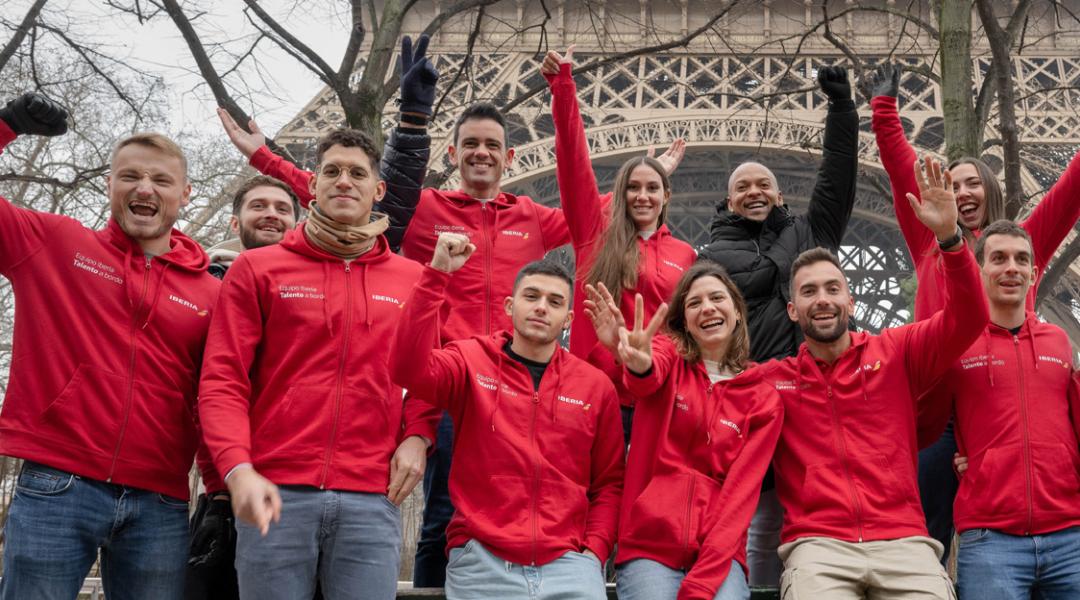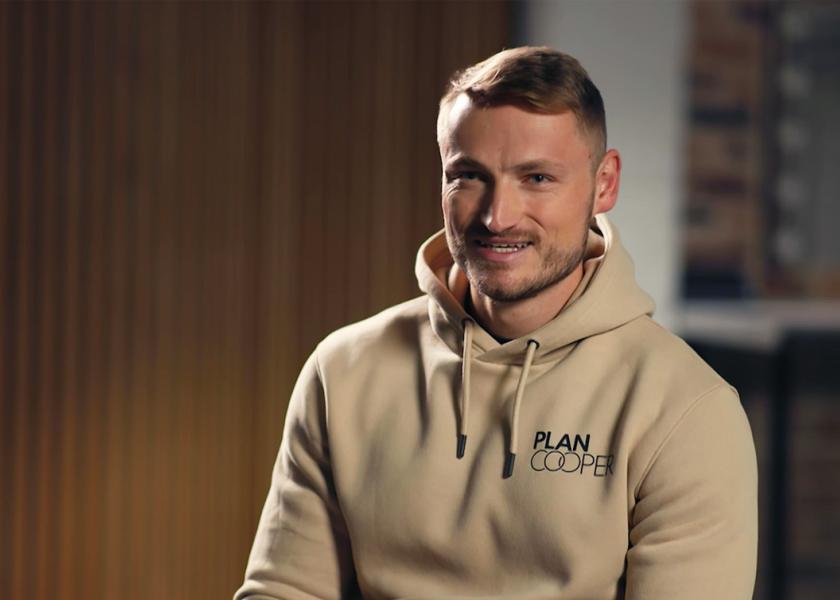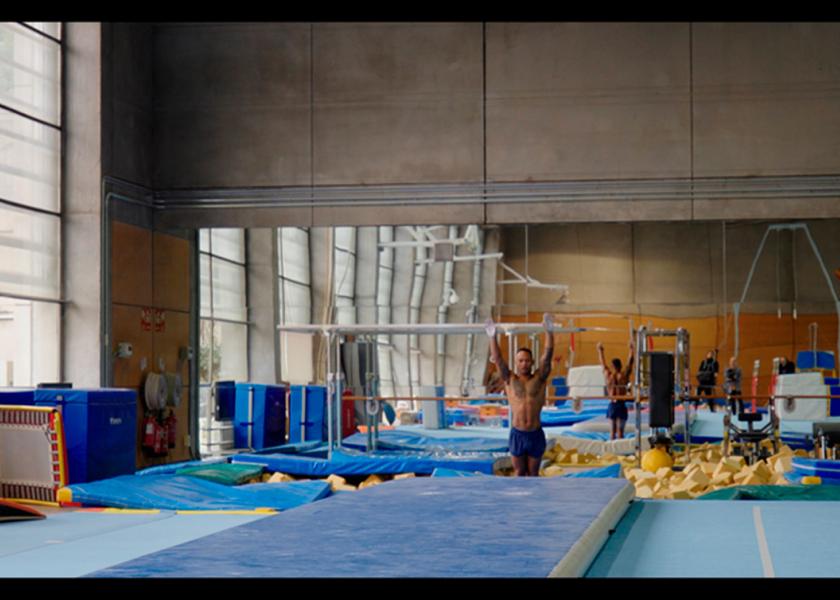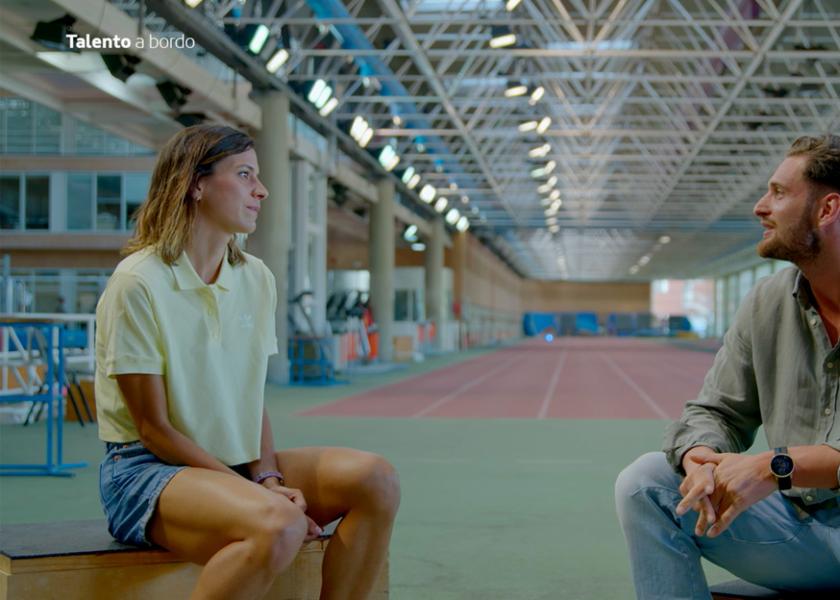Iberia Talento a bordo Team
Alongside the best in Paris

The athletes on the Talento a Bordo Team gave their all in Paris. Some returned with a smile from ear to ear, others with a slightly disappointed frown, but every one of them with the satisfaction of a job well done. One bronze medal, from Marcus Cooper —the flag bearer for the Spanish delegation— and no less than ten diplomas, given to the eight best athletes in each competition, was the bountiful result.
After the Tokyo Games, Iberia, as part of its Talento a bordo initiative, brought together another group of athletes to support them on their path towards the Paris Games. From emerging to renowned talent, from taekwondo to sports climbing, from Cáceres to Barcelona, this mixed group became a source of inspiration thanks to their willpower. And then came the day that the Olympic cauldron was lit again to open the greatest sports event in the world. Next, we’ll go over the individual performances of all the members on the team.
Ray Zapata
On Saturday the 3rd of August, Ray Zapata started his routine for the floor final with a concentrated, serious look on his face, ending with a big smile. The exercise looked promising, but after a lengthy deliberation, the judges gave the Spanish gymnast a score of 14.333, far removed from the 14.600 he’d scored to qualify for the final (the third best score). At the end of the session, which ended with the victory of the Filipino Carlos Yulo (15.000), Ray admitted he’d made mistakes and seemed satisfied with his seventh place.
Rodrigo Conde
This Galician rower, alongside his teammate Aleix García, got to the 2,000-metre double scull final with the fourth best time. The goal for this Spanish pair, who came second in the 2022 World Championships, was to go one step further and get onto the podium, but they had to settle for fifth place (06:20.59). They had a spectacular start —leading the first 400 metres—, but as the competition wore on, so did their fatigue. Their efforts did not win them a medal, but they did manage a diploma which was a sweet win.
Hugo González de Oliveira
This swimmer from Mallorca, who at the last World Championships held in Doha in February won gold in 200 metres backstroke and silver in 100 metres backstroke, dreamt of stepping onto the podium in Paris, but he’ll have to wait until the Games in Los Angeles. Both for the 100-metre and 200-metre finals, this backstroke swimmer came sixth, skimming the medals: he was 34 hundredths and 62 hundredths respectively from the bronze medal. Given the high level of swimming at the Games, these are two diplomas that are worth the highest recognition.
Diego García Carrera
After several days without winning a medal, the 20-km race walking boosted the morale of the Spanish delegation thanks to the bronze medal won by Álvaro Martín. A competition in which Diego García Carrera had to settle for 33rd place. This race walker from Madrid did not have the best day and, halfway through the race, saw his chances of at least matching the diploma he won in Tokyo, where he came sixth, disappear before his eyes. With a time of 1:23:10, he was far from his personal best, 1:17:32 which he set just a year ago at the World Championships in Budapest.
Niko Shera
The efforts made by Niko Shera, who while preparing for the Olympics had to overcome a serious knee injury and change category, from -90kg to -100kg, were not rewarded in Paris. This Spanish judoka born in Georgia didn’t make the bronze medal after losing against the Uzbek Muzaffarbek Turoboyev, a 2-metre-tall giant. The two-time World champion (2018 and 2021) could not hide his disappointment, which compounds the disillusion he already suffered in Tokyo. After the competition, he confessed that nerves and pressure made his life difficult.
Irene Sánchez-Escribano
This athlete from Toledo achieved her main goal: getting into the 3000m steeplechase final. And she did so by breaking her personal best: 09:17.39. But that’s not all... At the final, the fastest in history —8:52.76 for Bahraini Winfred Yavi—, she crushed her personal best again, stopping the stopwatch at 9:10.43, just shy of beating the national record for Spain (9:09.39), currently held by Marta Domínguez since the 25th of July 2009. An 11th place that gets rid of the thorn in her side from Tokyo, where she couldn’t take part because of an injury, and which we can only describe as: as good as it gets!
Antía Jácome
In Tokyo, Antía Jácome finished fifth in the C1 200 final. In Paris, she took one step further and finished fourth, just 42 hundredths from the podium but winning a new Olympic diploma. Will the medal come in Los Angeles? For sure! Being one of the eight best in the world in one discipline is difficult, doing so in two is almost mission impossible, but not for this Galician athlete, who the day before came sixth in the C2 500 final alongside María Corbera in a final where the wind affected the athletes’ performance.
Adriana Cerezo
Adriana Cerezo, who won the Olympic silver in Tokyo, got to Paris full of hope and confidence. After a cycle full of good international results, this taekwondo athlete was the second seed of the competition but did not get passed the quarter finals. She fell to Iranian Mobina Nematzadeh, who managed to stop this Spanish whirlwind in her tracks, but was then incapable of getting to the final, keeping Adriana from the repechage that would have allowed her to fight for the bronze medal. Adriana left Paris sad and disappointed but is already thinking about making up for it in Los Angeles.
Alberto Ginés
This Spanish climber’s modest performance in the boulder discipline penalised him massively throughout the entire competition in Paris. He qualified for the final with the fourth best score: 100.7 points (28.7 for boulder and 72.0 for lead). In the final, he hoped to improve his boulder performance for a chance to fight for the medals in his specialty, lead, but only scored 24.1 points. Despite achieving a fantastic score of 92.1 in lead for a total of 116.2 points, Alberto had to settle for a commendable seventh place.
Marcus Cooper
Gold in Río, silver in Tokyo and bronze in Paris! This canoeist from the Balearic Islands, who was the flag bearer alongside Támara Echegoyen during the opening ceremony, now has a full medal collection. Alongside his K4 500 teammates, Carlos Arévalo, Rodrigo Germade and Saúl Craviotto, he crossed the finish line behind the German and Australian boats. The next day, Marcus faced another final, for the K2 500 alongside Adrián del Río. After a huge comeback in the last few metres, the pair narrowly missed the podium, coming in fourth place.
Sarai Gascón
The Paralympic swimmer added to her medal count in Paris with a bronze in the 4x100 styles. Only Australia and the Netherlands beat Spain —Nuria Marqués, Íñigo Llopis and Óscar Salguero joined Sarai on the podium— in an evenly matched final. With her six silver medals and, now, three bronze medals in five Games —Beijing, London, Rio, Tokyo and Paris— the Catalan is adding to her legend. Although Sarai longed for a gold, the only medal missing from her track record, her performance was splendid, as in this edition she won another four diplomas.


